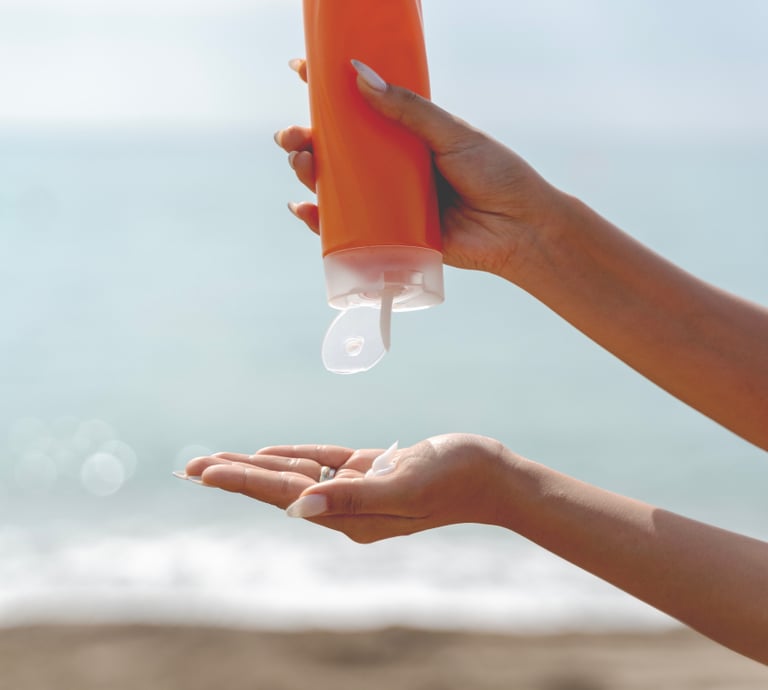Sunscreen and Benzene Update
In recent years, concerns have emerged regarding the presence of benzene in certain sunscreen products. Benzene is a chemical that is known to be harmful to human health, and its detection in sunscreen raises questions about the safety and efficacy of these essential sun protection products.
This update aims to provide the American public with crucial information about benzene exposure, its potential health risks, and guidance on selecting safe sunscreen options to ensure you and your family can enjoy the sun safely and confidently.


Protect Your Skin, Stay Informed: Choose Sunscreen Wisely!
Protect Your Skin: The Latest on Sunscreen Safety
Understanding Benzene in Sunscreens
What You Need to Know
Sunscreen is a crucial component of any skincare regimen, protecting our skin from the harmful effects of ultraviolet (UV) radiation and reducing the risk of skin cancer. As awareness of skin health continues to grow, consumers are increasingly vigilant about the ingredients in their skincare products. Recently, concerns have emerged regarding the presence of benzene—a known carcinogen—in certain sunscreens. Benzene can be harmful to human health, raising alarms among dermatologists and health professionals alike. In this update, we will explore the implications of these findings, the health risks associated with benzene exposure, and what consumers can do to make informed choices about their sun protection products.
What is Benzene?
Benzene is a colorless, volatile liquid hydrocarbon with a sweet odor, known for its distinct chemical properties. Its chemical formula is C₆H₆, indicating that it consists of six carbon atoms arranged in a hexagonal ring, with each carbon atom bonded to a hydrogen atom. Benzene is classified as an aromatic hydrocarbon due to its stable ring structure, which allows it to undergo a range of chemical reactions.
Chemical Properties of Benzene:
Structure: Benzene has a planar structure, with alternating double bonds between carbon atoms, contributing to its stability.
Solubility: It is non-polar and relatively insoluble in water, but it can dissolve in organic solvents.
Volatility: Benzene evaporates quickly at room temperature, making it widely used as a solvent in various industrial applications.
Benzene in Sunscreens:
Despite its beneficial uses in manufacturing and industry, benzene is not an intended ingredient in cosmetic products. However, it has been detected in some sunscreen formulations, often as an unintended contaminant. The presence of benzene in sunscreens can result from:
Manufacturing Processes: Benzene can be introduced during the production of raw materials or through the contamination of equipment used in the manufacturing process.
Environmental Factors: Benzene can also be absorbed from the environment during storage or distribution, particularly in facilities where benzene is present.
This unexpected discovery has raised significant concerns regarding consumer safety, prompting manufacturers and regulatory bodies to reevaluate testing methods and product formulations. Understanding the origins of benzene contamination in sunscreens is crucial for ensuring the safety and effectiveness of sun protection products.
Health Risks Associated with Benzene
Benzene is classified as a human carcinogen by several health organizations, including the U.S. Environmental Protection Agency (EPA) and the International Agency for Research on Cancer (IARC). This classification underscores the significant health risks associated with benzene exposure, particularly with long-term or repeated contact.
Potential Health Effects:
Carcinogenic Risks:
Long-term exposure to benzene has been linked to an increased risk of several types of cancer, particularly leukemia, which is a cancer of the blood-forming tissues. Studies have shown that individuals who are exposed to benzene over extended periods may develop blood disorders, including aplastic anemia and myelodysplastic syndromes.
Hematological Effects:
Benzene exposure can affect the bone marrow, leading to reduced production of blood cells. This can result in conditions such as anemia (low red blood cell count), thrombocytopenia (low platelet count), and leukopenia (low white blood cell count), all of which can compromise the immune system and overall health.
Neurological Effects:
Short-term exposure to high levels of benzene can lead to neurological symptoms such as headaches, dizziness, drowsiness, confusion, and even loss of consciousness. Chronic exposure may result in more severe neurological damage.
Reproductive and Developmental Risks:
Some studies suggest that benzene exposure may negatively impact reproductive health, leading to irregular menstrual cycles, reduced fertility, and developmental issues in fetuses, including low birth weight and congenital anomalies.
Respiratory Issues:
Inhalation of benzene vapors can irritate the respiratory tract, causing symptoms such as coughing, wheezing, and shortness of breath. Chronic exposure may lead to more serious respiratory conditions.
Given the significant health risks associated with benzene exposure, it is crucial for consumers to be aware of the potential presence of this harmful chemical in products like sunscreens. Staying informed and choosing products that are free from harmful contaminants is vital for protecting both skin health and overall well-being.
Recent Findings and Updates
Recent investigations into the safety of sunscreen products have revealed concerning levels of benzene contamination in several well-known brands. A series of independent studies and laboratory tests conducted in 2021 and 2022 have raised alarms among health officials and consumers alike. Here are some key findings and updates:
Key Studies and Reports
Independent Laboratory Testing:
In 2021, a study by the Valisure pharmacy discovered that several sunscreen products contained detectable levels of benzene. They tested over 200 sunscreen and after-sun products and found benzene in 78 of them, with concentrations exceeding the safety limits set by the FDA.
Reported Brands:
Specific brands that have been tested and found to contain benzene include:
Neutrogena: Certain aerosol sunscreens from this brand were identified to have benzene levels.
Banana Boat: Some of their spray sunscreens were also tested and found to contain trace amounts of benzene.
Aveeno: Reports indicated benzene contamination in select products.
In light of these findings, many consumers have raised concerns about the safety of these widely-used products.
Regulatory Responses
FDA Actions:
Following these reports, the U.S. Food and Drug Administration (FDA) issued guidance urging consumers to check the labels of their sunscreens and be aware of potential contamination. While the FDA has been monitoring the situation, it has not yet issued a nationwide recall of affected products.
The agency is also working to update regulations regarding the testing of sunscreens to ensure that any contaminants, including benzene, are identified and addressed before products reach the market.
Manufacturer Responses:
In response to the findings, several manufacturers have initiated voluntary recalls of specific products to protect consumer safety. For instance, certain Neutrogena and Banana Boat aerosol sunscreens were recalled in 2021 after testing positive for benzene.
Many companies are also reformulating their products and implementing stricter quality control measures to prevent benzene contamination in future batches.
As the concerns surrounding benzene in sunscreens continue to unfold, consumers are encouraged to stay informed and vigilant. Regularly checking product labels, seeking alternatives, and being aware of safety updates from trusted sources will help ensure that you choose safe and effective sun protection products.
Safety Guidelines for Sunscreen Use
Choosing the right sunscreen is essential for protecting your skin from harmful UV rays while minimizing the risk of exposure to harmful chemicals like benzene. Here are some practical tips for consumers to ensure they select safe and effective sunscreen products:
Look for “Free from Harmful Chemicals”
Choose sunscreens that explicitly state they are “free from harmful chemicals” or “no benzene” on their labels. This designation often indicates that the product has been formulated without known harmful substances and may have undergone rigorous testing for safety.
Check for Certifications
Seek out products that have been certified by reputable organizations, such as the Skin Cancer Foundation or Environmental Working Group (EWG). These certifications indicate that the product meets strict safety and efficacy standards, providing peace of mind regarding its ingredients.
Read Ingredient Lists Carefully
Always review the ingredient list on the sunscreen packaging. Look for mineral-based sunscreens that contain zinc oxide or titanium dioxide, as they are less likely to contain harmful contaminants compared to some chemical sunscreens.
Be cautious of ingredients that may indicate potential contamination, including any unfamiliar chemicals. If you see terms like “fragrance,” “parfum,” or complex chemical names, consider researching these ingredients further.
Choose Reputable Brands
Opt for sunscreen brands that have a solid reputation for safety and transparency. Established companies are more likely to conduct thorough testing and adhere to industry regulations.
Stay Informed About Recalls and Warnings
Keep an eye on updates from regulatory bodies like the FDA regarding sunscreen safety. Being informed about recalls or safety alerts can help you make better decisions when purchasing sunscreen.
Test for Allergies and Reactions
Before applying a new sunscreen to larger areas of your skin, perform a patch test by applying a small amount to a discreet area. Monitor for any allergic reactions or irritation, especially if you have sensitive skin.
By following these safety guidelines, you can make informed choices when selecting sunscreen products. Protecting your skin from UV rays is crucial, and being vigilant about the ingredients in your sunscreen can help ensure that you are using a safe product for you and your family.
Alternatives to Traditional Sunscreens
As concerns about harmful chemicals in conventional sunscreens grow, many consumers are seeking safer alternatives. Mineral-based sunscreens, which utilize natural ingredients to protect the skin from UV radiation, have gained popularity for their efficacy and safety. Here are some suggestions and a brief overview of the benefits of using mineral versus chemical sunscreens.
Suggestions for Mineral-Based Sunscreens
Zinc Oxide Sunscreens:
EltaMD UV Clear Broad-Spectrum SPF 46: This lightweight formula contains zinc oxide and is suitable for sensitive and acne-prone skin, offering broad-spectrum protection without harmful chemicals.
Neutrogena Sheer Zinc Mineral Sunscreen SPF 50: Known for its effective protection and non-greasy feel, this sunscreen is formulated with 100% zinc oxide, providing excellent broad-spectrum coverage.
Titanium Dioxide Sunscreens:
Aveeno Positively Mineral Sensitive Skin Sunscreen SPF 50: This sunscreen uses titanium dioxide to offer high-level sun protection, specifically designed for sensitive skin without synthetic fragrances or parabens.
Blue Lizard Australian Sunscreen SPF 30: This mineral sunscreen contains both zinc oxide and titanium dioxide, making it ideal for outdoor activities, with a formula that is free from oxybenzone and other harmful chemicals.
Combination Mineral Formulas:
Badger Unscented Sunscreen Cream SPF 30: Made with natural ingredients, this sunscreen is a favorite for families, offering reliable mineral protection without any harmful additives.
Coppertone Pure & Simple Mineral Sunscreen SPF 50: This product combines zinc oxide with natural oils for a moisturizing formula that is safe for sensitive skin and free from harmful chemicals.
Benefits of Using Mineral vs. Chemical Sunscreens
Immediate Protection: Mineral sunscreens start working immediately upon application, providing instant protection against UV rays, while chemical sunscreens typically require about 20 minutes to become effective.
Broad-Spectrum Coverage: Mineral-based sunscreens provide broad-spectrum protection by reflecting both UVA and UVB rays. Chemical sunscreens may absorb UV rays but can sometimes fail to provide complete protection against all types of UV radiation.
Fewer Allergens: Mineral sunscreens are generally less likely to cause skin irritation or allergic reactions, making them a better choice for sensitive skin or those with specific skin conditions.
Environmental Impact: Many mineral sunscreens are reef-safe and do not contain harmful chemicals that can damage marine life. This makes them a more environmentally friendly option compared to some chemical sunscreens.
Less Risk of Hormonal Disruption: Mineral sunscreens do not contain ingredients like oxybenzone, which have been linked to hormone disruption and other health concerns.
Switching to mineral-based sunscreens can offer a safe and effective alternative to traditional chemical formulations. By choosing products that prioritize natural ingredients, you can protect your skin from harmful UV rays while minimizing the risk of exposure to potentially harmful chemicals.
Consumer Resources
As consumers become more aware of the potential risks associated with sunscreen products, having access to reliable information and resources is essential. Below are links to trusted sources that provide valuable insights into sunscreen safety, ingredient transparency, and overall skin health.
Trusted Sources for Sunscreen Safety Information
U.S. Food and Drug Administration (FDA)
The FDA provides guidelines on sunscreen regulations, safety, and effectiveness. Stay updated on recalls and safety alerts related to sunscreen products.
Visit the FDA's Sunscreen Safety Page (https://www.fda.gov/drugs/understanding-over-counter-medicines/sunscreen-how-help-protect-your-skin-sun)
Centers for Disease Control and Prevention (CDC)
The CDC offers comprehensive information about sun safety, skin cancer prevention, and the importance of sunscreen in protecting against harmful UV rays.
Explore the CDC’s Sun Safety Resources (https://www.cdc.gov/skin-cancer/resources/index.html)
American Academy of Dermatology (AAD)
The AAD is a leading professional organization of dermatologists that provides evidence-based information on skincare, including tips on choosing effective sunscreens.
Check Out the AAD’s Sunscreen Recommendations (https://www.aad.org/public/everyday-care/sun-protection/shade-clothing-sunscreen/how-to-select-sunscreen)
Skin Cancer Foundation
This organization focuses on educating the public about skin cancer prevention and promotes the importance of sun protection and regular skin checks.
Visit the Skin Cancer Foundation’s Sun Safety Page (https://www.skincancer.org/skin-cancer-prevention/sun-protection/sunscreen/)
Product Safety Databases
Environmental Working Group (EWG)
The EWG’s Skin Deep database provides comprehensive information on cosmetics and personal care products, including sunscreens. Consumers can search for specific products to learn about their ingredients and safety ratings.
Explore the EWG’s Skin Deep Database (https://www.ewg.org/skindeep/)
Consumer Reports
This nonprofit organization offers independent testing and reviews of various consumer products, including sunscreens. Their reviews can help consumers make informed choices based on effectiveness and safety.
Check Out Consumer Reports’ Sunscreen Ratings (https://www.consumerreports.org/cro/sunscreens/buying-guide/index.htm)
Staying informed about sunscreen safety and the potential risks of harmful chemicals is vital for maintaining healthy skin. By utilizing these trusted resources and checking product safety databases, you can make educated decisions about your sun protection products and ensure your family's safety.
Protecting your skin from harmful UV rays is essential for maintaining overall skin health and reducing the risk of skin cancer. As we navigate the complexities of sunscreen safety, it is crucial to remain informed about the products we use and the potential risks associated with certain chemicals, such as benzene.
By choosing safe and effective sunscreen options—particularly mineral-based formulas—and staying vigilant about ingredient transparency, you can safeguard your skin while enjoying the outdoors. We encourage you to explore trusted resources, keep up to date on sunscreen regulations, and review safety guidelines regularly.
Your skin deserves the best protection, so make informed choices to ensure your sun safety and well-being.
Contact a Dermatologist






